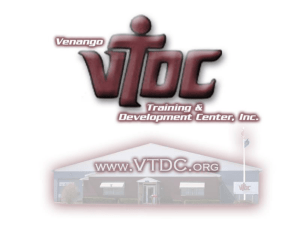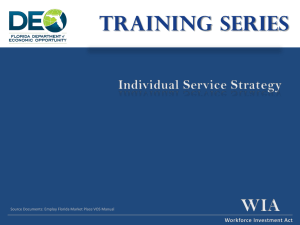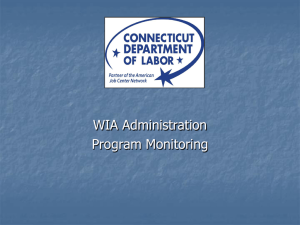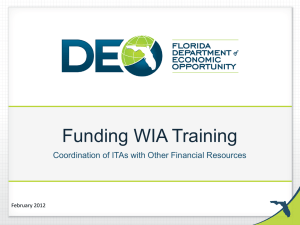TRAINING SERIES
advertisement
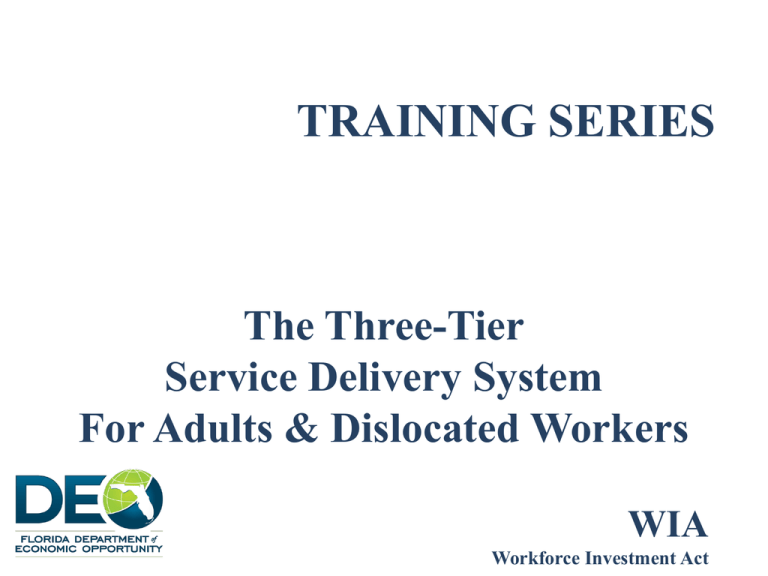
TRAINING SERIES The Three-Tier Service Delivery System For Adults & Dislocated Workers WIA Workforce Investment Act Three-Tier System Overview Core Services Intensive Services Training Services WIA Core Services Entry-level services that may be assisted or unassisted. Examples: Information about labor market & demand occupations Information about training providers & programs Information about WIA and other resources in area Skills assessment Job readiness workshops Job search assistance Resume & interviewing assistance Testing & background checks required by employer Mentoring & networking WIA Intensive Services Intensive services provide a more focused and comprehensive inquiry into a client’s status, goals, and needs. Eligibility for intensive services: Individual must have received at least one core service, and Individual must be determined to be in in need of intensive services to obtain or retain employment that leads to self-sufficiency WIA Intensive Services When WIA Adult funds are limited, local boards are required to give priority to low-income individuals and those who receive public assistance. A local board may set the criteria for priority of service for adults in its area. WIA Intensive Services Examples of Intensive Services: Comprehensive Assessment Development of an Individualized Employment Plan/Career Plan Counseling Short-Term Prevocational Services Stand-Alone Adult Education & Literacy Case Management Work-Based Services (work experience or internship) WIA Training Services Eligible adults and dislocated workers who do not obtain employment through intensive services may be referred to training. Eligibility criteria for training services: Individual meets the eligibility requirements for intensive services Individual is unable to obtain or retain employment through intensive services WIA Training Services Considerations for the appropriateness of training: Client assessed as needing the training Client assessed as having skills, qualifications, and/or resources needed to succeed in training Client selects training that is directly linked to employment opportunities in area or in another area in which the client is willing to relocate WIA Training Activities Common training activities: Occupational Skills Training (OST) On-the-Job Training (OJT) Customized Training WIA Training Activities Other training activities: Entrepreneurial Training Skill Upgrading and Retraining Programs Combining Workplace Training with Related Instruction Training Programs Operated by Private Sector Adult Education & Literacy in combination with Other Training WIA Occupational Skills Training Occupational skills training (OST): Offered in a post-secondary educational setting Teaches skills necessary for specific occupation (e.g. carpentry, nursing, accounting) Prepares clients for immediate employment upon completion of training (maybe after licensure) WIA Occupational Skills Training Occupational skills training: Results in a degree or certificate May prepare for entry level as well as advanced level WIA Occupational Skills Training OST provided by: Vocational/Technical Institutions Community Colleges Universities Private Postsecondary Institutions WIA Occupational Skills Training Occupational skills training is not: Apprenticeship (this is a separate WIA training activity) General literacy classes (remedial English, ESL) General subject postsecondary education (e.g., BA in English) Personal development classes (e.g., yoga) WIA Eligible Training Providers WIA law requires that OST funded with local WIA funds must be provided by Eligible Training Providers. The State and local boards are responsible for maintaining an Eligible Training Provider List (ETPL) WIA Eligible Training Programs Eligible Training Programs: Must be on Targeted Occupation Lists (TOL) http://www.labormarketinfo.com/wec/targetoccupationlist.htm WIA Individual Training Account (ITA) An ITA acts like a voucher which a WIA participant may use to pay training expenses, such as tuition, fees, required books & supplies WIA-funded Occupational Skills Training: Customer choice Generally offered through ITA WIA Individual Training Account (ITA) WIA-funded Occupational Skills Training: Coordinated with Pell Grants and other financial aid RWB may impose a cap on funding of ITAs Memorandum of Understanding (MOU) with training institution WIA Quality OST Targets jobs that provide high earnings, strong employment growth, and opportunity for individual advancement Provides students with pathways/ladders for further education opportunities Develops and expands the use of technology Allows transfer to other institution if necessary Prepares students adequately for licensure, when required WIA Quality OST Appropriate mix of academic education, occupational skills, and work-based learning Well equipped to deal with special populations (e.g., students with disabilities) Provides appropriate support services for students, especially those with barriers Collects appropriate information about results and uses data to improve quality WIA OST Non-ITA In rare situations, a WIA client may be enrolled in OST Non-ITA: Co-enrollment with another program that funds the student (e.g., TAA) RWB enters into contract with Community Based Organization that specializes in services to special population with barriers Statewide Grant authorizes provision of training through non-ITA WIA Quiz 1 Occupational Skills Training must always be offered through an Individual Training Account. True False WIA Quiz 2 Match the following activities to the correct tier. C=Core, I=Intensive 1. Case Management 2. Work-Based Services (e.g., internship) 3. Individual Employability/Career Plan 4. Resume & Interviewing Assistance 5. Labor Market Information WIA Quiz 3 To qualify for training, an adult or dislocated worker must have received at least one core service and one intensive service. True False WIA Questions or Additional Information If you have any questions or for additional information, please contact DEO’s WIA policy and technical assistance staff at: WP_WIAProgramInfo@deo.myflorida.com. WIA
